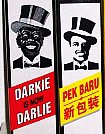When You Brush Your Teeth With ..... Siwak-F
Some years ago when poverty-stricken and suffering from excruciating toothache and a near mortal dread of dentists, I took myself off to the Royal Dental Hospital where I'd heard that dental students did whatever dentists do, only for free.
Their supervisor informed me that my molars were in such rotten condition that he wouldn't allow his students anywhere near them. I grimaced, such was the pain, and pointed out that his students wouldn't find a better set to work on. He agreed and five, or was it eight?, injections later, another gap appeared in my gums.
It still makes me cringe to even think about it ~ oh, and you too? ~ but I only mention it because I had to sit through an office discussion recently about the merits of different toothpastes and powders. Of course, the colleague who recommended imported Sensodyne at Rp.25,000 (c.US$4) a can soaks his teeth in a glass overnight.
If, like me, you don't understand why anyone would want to earn a living by sticking their fingers into halitosis-ridden orifices, then do come back tomorrow. Those of you who want to learn more may be interested in some research I've been doing into why I haven't visited a dentist since I arrived in Indonesia way back when.
I started off by visiting Toothpaste World. Their Indonesian collection doesn't feature Siwak-F, my chosen brand (because it's the cheapest and tastes good), but does have a picture of Hazelnut Chocolate Toothpaste (eh?) as well as their collection of infamous Darkie/Darlie toothpaste from Asia.
From SinoSplice Blog: Hong Kong's Hazel & Hawley Chemical Co. would probably still be hawking Darkie toothpaste had the company not been acquired by Colgate. The Darkie brand's Al Jolson-inspired logo, a grinning caricature in blackface and a top hat, was as offensive as its name. Colgate bought the company in 1985, and then ditched the logo and changed the product's name to Darlie after US civil rights groups protested. However, the Cantonese name - Haak Yahn Nga Gou (Black Man Toothpaste) - remains (in China).
Da Xiangchang Comments:
A common perception among the Chinese is that black people have the nicest, whitest teeth, hence the toothpaste. This toothpaste goes waayyyy back. I think my grandparents have even heard of it. But is Darkie Toothpaste any worse than Aunt Jemima products in America? Of course, the name 'Darkie' is a lot more offensive, but Aunt Jemima taps into all the slavery days where some house slave cooks for the white family. So I don't know. Both seem equally offensive to me.
I'll admit that I used to find imported Darkie/Darlie a most refreshing way to start my day, but being a good housekeeper, some might say a tightwad, I was pleased to find an acceptable cheaper, at Rp.6,700, substitute in Siwak-F which is produced locally.

I've now discovered that it's halal. In other words, it is one of the few toothpastes which Muslims are encouraged to use. You see, it contains a natural Miswak Powder (Salvadora Persica) for Reducing Plaque, Remove tartar and Prevents gum infection.
And what is miswak?
The miswak is a natural tool for brushing the teeth. It is taken from the roots and branches of particular desert trees. It differs from one region to another, but in Arabia and Asia it is taken from the Arak tree.
The Prophet [sallallahu alayhe wa sallam (SAWS)] recommended Muslims to clean their teeth using a miswak every day; especially after waking, when performing wudhu, before salah, when reciting the Qur'an, before sleeping, and when the mouth smells bad.
There are many ahadeeth that speak about it. Following are some of them:
A'isha said that the Prophet (SAWS) said, "Ten things are natural (for one to do): Trimming the moustache, growing a beard, (using) the miswak, sniffing up water, cutting the nails, washing hands, plucking armpits, shaving pubic hair, and conserving water".
There are a few things in that list that I don't do regularly ~ sniff up water? pluck my armpits? ~ and my miswak comes in a plastic tube rather than being the root source. I think I'd prefer chewing the root; it would cut down on toothbrushes. After all, this technique has been well-proven over the centuries.
The activity of keeping the mouth clean dates all the way back to the religious figure Buddha. It has been recorded that he would use a "tooth stick" from the God Sakka as part of his personal hygiene regimen. (I have already told you that Jakartass is ecumenical.)
The alternatives have not been so successful.
In 23 - 79 AD the practice of oral hygiene included:
* Drinking goats milk for sweet breath
* Ashes from burnt mice heads, rabbits heads, wolves heads, ox heels and goats feet were thought to benefit the gums. (This probably wouldn't go over very well today)
* Picking the bones out of wolves excrement and wearing them (maybe in the form of a necklace?) was considered to be a form of protection against toothaches.
* Washing your teeth with the blood from a tortoise three times a year was a sure bet against toothaches as well.
* Mouthwashes were known to consist of pure white wine, or (get ready for this one) old urine kept especially for this purpose.
So, there you have it.
By the way, I smile with my lips only slightly parted because I really do need to see a dental surgeon.






